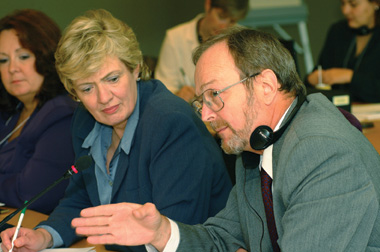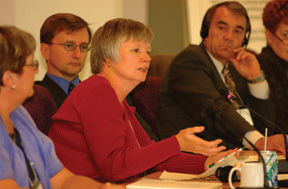 More flexible teacher education,
improved incentives, higher starting salaries and a concerted effort to improve
the public image of teachers all need to be urgent priorities as education
stakeholders work together to overcome the province-wide teacher shortage. More flexible teacher education,
improved incentives, higher starting salaries and a concerted effort to improve
the public image of teachers all need to be urgent priorities as education
stakeholders work together to overcome the province-wide teacher shortage.
Representatives from 24 Ontario education groups who met September 25 at the
College agreed that these changes are important steps in maintaining standards
of instruction.
"We must avoid the temptation of guaranteeing the supply of teachers
through diluting the quality of the qualifications that our teachers bring to
students in our classrooms," said College Registrar Joe Atkinson.
"We must continue to maintain the public trust that children in our schools
will be taught and supervised by qualified and certified teachers, principals
and supervisory officers. We need our teaching staff to be competent and to
ensure that children are safe in our charge."
S T A K E H O L D E R S P U L L I N G T O G E T H E R
Representatives from the teachers’ federations, school boards, education
stakeholders, parents, students and the College put their minds together to put
forward elements of a plan to help deal with Ontario’s teacher shortage.
"This issue requires collaboration on all parts if we are going to ensure
that there is an adequate supply of qualified and certified teachers for Ontario
schools," said Atkinson. "We must realize that this is a multifaceted
issue and that there are many pieces to the puzzle that need to be put in place
to ensure that our profession remains strong."
The event brought together a wide range of people who have first-hand knowledge
and experience of the problems affecting schools throughout the province because
of the lack of qualified teachers. Last year alone, the government issued about
1,300 Letters of Permission — up from 800 in 2000 — to allow the use of
unqualified individuals as teachers in classrooms across the province.
The main objectives of the consultation were to assist the College in developing
advice to the Minister of Education to ensure an adequate supply of qualified
and certified teachers in Ontario classrooms and in leadership positions and to
identify activities that the College and other stakeholders can undertake to
find solutions to the teacher shortage.
C O L L E G E F I R S T T O P U B L I S
H S T U D Y O N T E A C H E R S
H O R T A G E
In 1998, the College published the first comprehensive study forecasting
Ontario’s teacher shortage, based on data drawn from its own registry. The
College’s registry is unique and the most comprehensive database in Ontario on
the teaching profession, listing the qualifications of the province’s 180,000
certified teachers and allowing for the detailed analysis of the trends shaping
the profession.
Since its initial study, the College has published a regional analysis of the
teacher shortage, showing that no area of the province is being spared and that
the difficulty in recruiting teachers will last until the end of the decade. The
College reports also showed critical shortages across the province in math,
science, computer studies, technological studies and French, as well as in
leadership positions of vice-principal and principal. Significant retirements
will also create pressures in subjects like English and history.
The College’s teacher shortage study led to the creation of a special
Minister’s Task Force, supported funding of an additional 1,500 spaces in
faculties of education, and spurred co-operative efforts by a wide range of
stakeholders to ensure that Ontario students continue to be taught by competent
and appropriately qualified teachers.

The Ministry of Education also sponsored two important initiatives out of the
work of the task force. Last spring, the Ministry of Education Teacher Supply
and Demand Working Group produced a model for projecting teacher requirements
over the next 10 years and recently, the Ministry struck the Teacher Recruitment
and Renewal Working Group that is looking at options for recruitment and
retention of teachers.
As well, the College is now engaged in a study proposed by the Ontario
Teachers’ Federation and supported by the Ministry of Education to track the
retention and employment of the 2001 and 2002 graduates over five years.
C O N S U L T A T I O N F O C U S E S O N
F O U R T H E M E S
The College’s consultation focused on four themes identified by the
Minister’s Task Force on Teacher Recruitment and Renewal:
• Teacher Education
• Incentives and Flexible Work Arrangements
• Information and Data Management
• Communications and Outreach.
Teacher Education
How can the College support the
development of program and services that meet both the pre-service and
in-service needs of teachers?
Participants agreed that adding teacher education capacity was necessary and
that new initiatives — in addition to the existing programs — should offer
more flexibility. The approaches that garnered the most support were creating
part-time teacher education programs, developing teacher education partnerships
between faculties of education and school boards, developing satellite campuses,
expanding concurrent programs and integrating distance education components to
teacher education programs.
Participants also noted that new teachers need guidance, supervision and the
support of highly experienced and successful teachers in their first three to
five years of teaching. They stressed that current teaching schedules and
commitments make it difficult for experienced teachers to consider mentoring and
that release time, professional learning opportunities, curriculum resources and
compensation would help implement successful mentorship programs.
Incentives and Flexible Work Arrangements
This theme focused on the need to make teaching more attractive to
undergraduates and other students. Participants stressed that incentives
demonstrate that we value teachers and may help recruit students who are
hesitant to invest time and money in a teacher education program or who consider
a career elsewhere with the promise of higher pay. This is particularly true for
students who are bilingual or have qualifications in math, science or computer
studies, all specialities that are in short supply across the province.
Participants identified student loan forgiveness and scholarship programs, as
well as signing bonuses as effective incentives. They also indicated that such
initiatives should be based on research into what works in other jurisdictions
and what would be most effective in the Ontario context.
Participants advocated for higher starting salaries for new teachers, greater
experience recognition on the salary grid and improved maternity and parental
leave programs, among other options.
Information and Data Management
The need for comprehensive, reliable data is crucial to manage teacher supply
and demand. Currently, no one organization in Ontario has all the relevant
information required and although the College’s registry is a comprehensive
database of teacher qualifications, it requires additional data from school
boards, the Ministry of Education and the pension plan to produce the full
picture of the teacher shortage and to help develop appropriate plans.
The consultation also highlighted a common interest in conducting research on
which incentives or conditions would encourage graduates to enter teacher
education programs or retired teachers to work for the period of time permitted
under the pension plan.
Participants also indicated that research needs to be conducted on the
occasional teacher pool, finding out how large the pool is, who makes up the
occasional teacher pool and to what extent unqualified people are hired as
occasional teachers. It was suggested that similar information about the
immigrant teacher pool would help to determine what additional supports should
be put in place to help immigrant teachers become qualified and certified to
teach in Ontario.
Communications and Outreach
The importance of valuing the profession and increasing positive messages came
out loud and clear at the consultation. Participants stressed activities that
are already under way — mentoring kits, sharing teaching techniques online,
holding teacher appreciation days — and suggested the promotion of the
profession, recruitment through the web, seeking business and industry
endorsement of the profession, and encouraging the government to show its
support for the profession.
N E X T S T E P S
Council looked at the consultation report in November and recommended that the
report be shared with the Ministry of Education and all education stakeholders.
It also recommended further initiatives to develop co-ordinated and
collaborative action plans to put in place some of the proposals.
The College will continue to work with the Ministry to stress the need for
immediate action and seek the government’s support for some of the initiatives
put forward.
The College quickly acted upon the recommendation to recognize the value of the
profession by highlighting remarkable teachers in Ontario newspapers on
UNESCO’s World Teachers’ Day.
B l u e P a g e s A r t i c l e s
|


![]()
 More flexible teacher education,
improved incentives, higher starting salaries and a concerted effort to improve
the public image of teachers all need to be urgent priorities as education
stakeholders work together to overcome the province-wide teacher shortage.
More flexible teacher education,
improved incentives, higher starting salaries and a concerted effort to improve
the public image of teachers all need to be urgent priorities as education
stakeholders work together to overcome the province-wide teacher shortage.